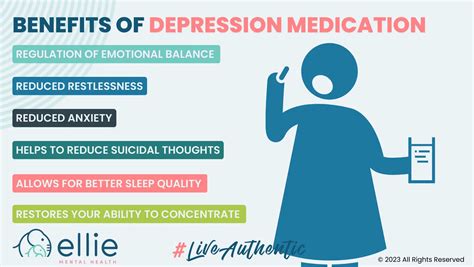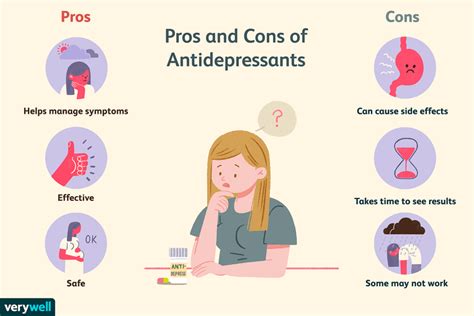Intro
Discover how antidepressants work, their effects, and benefits in managing depression, anxiety, and mood disorders, with related treatments and therapies.
Antidepressants are a type of medication that plays a crucial role in managing and treating mental health conditions such as depression, anxiety disorders, and some sleep disorders. The importance of understanding how antidepressants work and their effects on mental health cannot be overstated, given the prevalence of these conditions worldwide. According to the World Health Organization (WHO), depression is one of the leading causes of disability globally, affecting millions of people. Therefore, exploring the role of antidepressants in treating these conditions is essential for promoting mental health awareness and support.
The mechanism of action of antidepressants is complex and involves various neurotransmitters in the brain, such as serotonin, dopamine, and norepinephrine. These chemicals are responsible for transmitting signals between brain cells, and an imbalance can lead to symptoms of depression and anxiety. Antidepressants work by increasing the levels of these neurotransmitters in the brain, which helps to improve mood, reduce anxiety, and enhance sleep quality. While the exact process is not fully understood, research suggests that antidepressants can also promote neuroplasticity, the brain's ability to adapt and change, which is crucial for recovery from mental health conditions.
Understanding the benefits and potential side effects of antidepressants is vital for individuals considering treatment options. On one hand, antidepressants have been proven to be effective in reducing symptoms of depression and anxiety, improving quality of life, and reducing the risk of suicide. On the other hand, they can have side effects such as nausea, headache, and weight gain, although these often diminish over time. The decision to start antidepressant medication should be made in consultation with a healthcare professional, taking into account the individual's medical history, the severity of their condition, and potential interactions with other medications.
How Antidepressants Work

Antidepressants can be classified into several types, each with a distinct mechanism of action. Selective serotonin reuptake inhibitors (SSRIs) are the most commonly prescribed antidepressants and work by increasing the levels of serotonin in the brain. Serotonin-norepinephrine reuptake inhibitors (SNRIs) increase the levels of both serotonin and norepinephrine, while tricyclic antidepressants (TCAs) affect the levels of serotonin, norepinephrine, and dopamine. Monoamine oxidase inhibitors (MAOIs) work by blocking the enzyme that breaks down these neurotransmitters, thereby increasing their availability in the brain.
Types of Antidepressants
The choice of antidepressant depends on the individual's specific condition, medical history, and personal preferences. For example, SSRIs are often prescribed for depression and anxiety disorders due to their relatively mild side effect profile. SNRIs, on the other hand, may be prescribed for conditions such as fibromyalgia and chronic pain, in addition to depression. It's essential to work closely with a healthcare provider to find the most appropriate antidepressant and dosage, as this can significantly impact the effectiveness of treatment and minimize side effects.Benefits of Antidepressants

The benefits of antidepressants are numerous and well-documented. They can significantly improve symptoms of depression and anxiety, enabling individuals to engage more fully in daily activities and improve their overall quality of life. Antidepressants can also reduce the risk of suicide, which is a critical consideration for individuals with severe depression. Furthermore, they can help manage chronic pain, improve sleep quality, and enhance cognitive function, all of which are essential for maintaining good mental and physical health.
Improving Mental Health
In addition to their therapeutic effects, antidepressants can play a role in promoting mental health awareness and reducing stigma around mental illness. By acknowledging the importance of mental health treatment and the effectiveness of antidepressants, individuals can feel more comfortable seeking help when they need it. This can lead to earlier intervention and better outcomes, as untreated mental health conditions can have severe consequences, including impaired relationships, decreased productivity, and increased risk of physical health problems.Potential Side Effects

While antidepressants can be highly effective, they can also have side effects. Common side effects include nausea, headache, dry mouth, and changes in appetite or sleep patterns. In some cases, antidepressants can cause more severe side effects, such as increased risk of bleeding, seizures, or suicidal thoughts, especially in young people. It's crucial to monitor side effects closely and report any concerns to a healthcare provider, as they can often be managed by adjusting the dosage or switching to a different medication.
Managing Side Effects
Managing side effects is an essential part of antidepressant treatment. This can involve lifestyle changes, such as regular exercise, a balanced diet, and sufficient sleep, which can help mitigate side effects and improve overall mental health. Additionally, healthcare providers can offer guidance on managing specific side effects, such as taking medication with food to reduce nausea or using relaxation techniques to improve sleep quality.Living with Antidepressants

Living with antidepressants requires a commitment to ongoing treatment and self-care. This can involve regular check-ins with a healthcare provider to monitor progress and adjust treatment as needed. It's also essential to maintain a healthy lifestyle, engage in activities that bring joy and fulfillment, and build a support network of friends, family, or support groups. By taking an active role in their treatment and prioritizing their mental health, individuals can maximize the benefits of antidepressants and improve their overall well-being.
Support and Resources
Access to support and resources is critical for individuals living with mental health conditions. This can include therapy or counseling, support groups, and online resources or hotlines. Healthcare providers can offer referrals to these services and provide guidance on navigating the mental health system. Additionally, friends and family can play a vital role in offering emotional support, understanding, and encouragement, which can make a significant difference in an individual's recovery journey.Conclusion and Next Steps

In conclusion, antidepressants are a valuable tool in the treatment of mental health conditions, offering significant benefits for individuals struggling with depression, anxiety, and other related disorders. By understanding how antidepressants work, their potential benefits and side effects, and the importance of ongoing treatment and self-care, individuals can make informed decisions about their mental health care. If you or someone you know is considering antidepressant treatment, it's essential to consult with a healthcare provider to discuss the best options and create a personalized treatment plan.
What are the most common types of antidepressants?
+The most common types of antidepressants include selective serotonin reuptake inhibitors (SSRIs), serotonin-norepinephrine reuptake inhibitors (SNRIs), tricyclic antidepressants (TCAs), and monoamine oxidase inhibitors (MAOIs).
How long does it take for antidepressants to start working?
+Antidepressants can take several weeks to start working, with some people noticing improvements in symptoms within 1-2 weeks, while others may take 6-8 weeks to experience the full benefits.
Can antidepressants be used to treat conditions other than depression?
+Yes, antidepressants can be used to treat a range of conditions, including anxiety disorders, chronic pain, fibromyalgia, and sleep disorders, among others.
We hope this information has been helpful in understanding the role of antidepressants in treating mental health conditions. If you have any further questions or would like to share your experiences with antidepressants, please don't hesitate to comment below. Your feedback and insights can help others who may be navigating similar challenges. Additionally, consider sharing this article with someone who might benefit from this information, and let's work together to promote mental health awareness and support.
